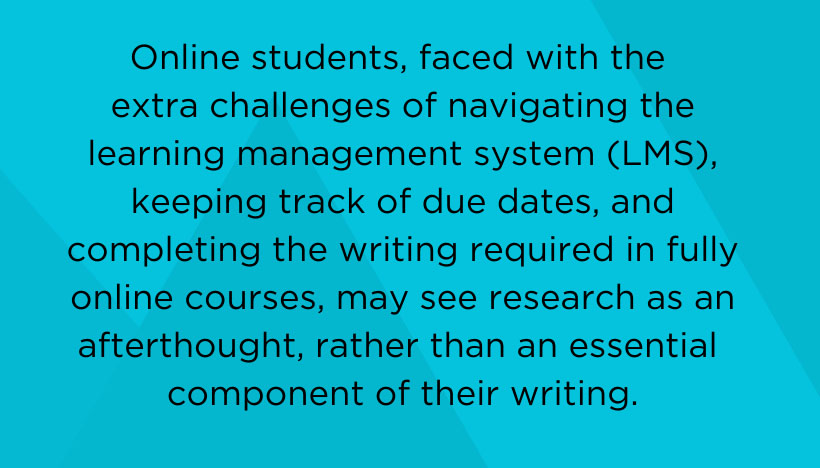This excerpt is taken from Kelly O. Secovnie and Lane Glisson’s article “Scaffolding a Librarian into Your Course: An Assessment of a Research-Based Model for Online Instruction,” from the December 2019 issue of Teaching English in the Two-Year College. The article describes how a course model featuring scaffolded information literacy instruction and connection with a librarian improves online students’ attitudes about library sources and the value of research in the writing process.
Integrating research skills into an online course can be challenging for both students and professors who design courses.
Many college students are not prepared in high school to adequately complete their research assignments. Although we hope students will learn to use academic sources and journalism for their papers, in reality their information-seeking strategies often begin and end with Google and YouTube.
Online students, faced with the extra challenges of navigating the learning management system (LMS), keeping track of due dates, and completing the writing required in fully online courses, may see research as an afterthought, rather than an essential component of their writing.
It is not uncommon for first-year students to think that research should mirror their personally held beliefs or to have other misconceptions about scholarship. The insertion of a librarian’s targeted research lessons and activities into the course and its writing assignments can be instrumental in developing students’ essential research skills and understanding of the research/writing process.
Knowing this, the authors, professors from the English and library departments of a large, urban community college, partnered to integrate research instruction into an online Introduction to Literature course from fall 2012 to spring 2018.
In this article, we give an overview of the course structure. Further details of how we designed the course have been published in our book chapter,“Making Library Research Real in the Digital Classroom:A Professor–Librarian Partnership” in Distributed Learning: Pedagogy andTechnology in Online Information Literacy Instruction (Glisson and Secovnie 177–203). To assess the efficacy of our interventions, we used identical pre- and post-course surveys to discover our students’ attitudes and reported behaviors about research (see Appendix A for the survey questions).
Our data, taken from their responses, suggests that the increased connections created by scaffolded interactions with a librarian improved student awareness and reported use of library-based research sources.These changes in the ways students view research, measured by the differences between their attitudes at the start of the course and those at the end of the course, confirmed that our scaffolded and connected approach to teaching research skills online was beneficial to students.
Scaffolded research lessons are preferable to the traditional library instruction lesson that attempts to cover library research strategies in a single hour. Rather than expecting students to retain and use the skills presented in a single library instruction class, we guided students to repeatedly access library resources and instructional videos that were tailored specifically to their needs in the course.
Throughout the semester, we introduced a variety of research skills, through videos, online activities, and the librarian’s posts. We reinforced those skills in subsequent assignments. We also established a personal connection between the librarian and the students by giving her a space alongside the instructor on the course LMS (including a picture, office hours, and a personal note). She connected with students through introductory and research-based discussion boards and via email and in-person appointments with students. By emphasizing a scaffolded approach bolstered by personal connections, our complete course is well suited to the challenges community college students typically encounter as they balance multiple priorities.
Read the full article “Scaffolding a Librarian into Your Course: An Assessment of a Research-Based Model for Online Instruction,” from the December 2019 issue of Teaching English in the Two-Year College.

 Kelly O. Secovnie is an associate professor of English at the Borough of Manhattan Community College, City University of New York. She is currently at work on a sabbatical project examining how African literature is used in community college general education “Introduction to Literature” courses, in order to provide resources for faculty wishing to teach it more effectively. Lane Glisson is an associate professor and e-learning and instruction librarian at the Borough of Manhattan Community College, CUNY. Her article, “Breaking the Spin Cycle: Teaching Complexity in the Age of Fake News” was published in the July 2019 issue of portal: Libraries and the Academy, Johns Hopkins University Press.
Kelly O. Secovnie is an associate professor of English at the Borough of Manhattan Community College, City University of New York. She is currently at work on a sabbatical project examining how African literature is used in community college general education “Introduction to Literature” courses, in order to provide resources for faculty wishing to teach it more effectively. Lane Glisson is an associate professor and e-learning and instruction librarian at the Borough of Manhattan Community College, CUNY. Her article, “Breaking the Spin Cycle: Teaching Complexity in the Age of Fake News” was published in the July 2019 issue of portal: Libraries and the Academy, Johns Hopkins University Press.

